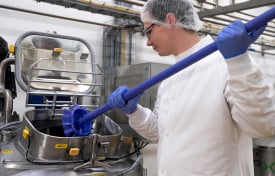food safety

- February 28, 2018
Using Metal Detectable Products in your facility is a great way to ensure the product that you ship out does not contain foreign materials. Metal Detectable Products are products that can be detected by a metal detector. In plastic products, such as pens, a metallic pigment is added to the resin during the manufacturing process, and it is this pigment that is actually detected by the metal detector. Other products, earplugs for example, contain a stainless steel ball bearing, which is then detected by the metal detector.
- July 27, 2017
- July 05, 2016
In the shadow of the towering Gateway Arch in St. Louis, Missouri, Nelson-Jameson will be displaying a host of products and services at the International Association for Food Protection Annual Meeting (IAFP)! From July 31st-August 2nd, swing by the Exhibit Hall at the America’s Center Convention Complex to see all we have to offer! Dayton, Fritz, Amanda, Barb, and Mat will be in attendance to help you check out several of our offerings, and to assist in figuring out how Nelson-Jameson can be of service in supplying your Lab, MRO, Processing, Ingredient, Packaging, and Cleaning Chemical needs!
- October 21, 2015
Nelson-Jameson, Inc. and DSM are proud to announce a new Delvotest® Antibiotic Residue Tests website! Geared towards meeting the needs of dairy farmers, dairy labs, and artisan/farmstead operations, the site features information on an array of kits, troubleshooting tips, and order links.
As part of our mutual commitment to food safety, Nelson-Jameson, Inc. and DSM sought to create a site where users in the Americas could learn more about the dangers of antibiotic residues in milk and how to most effectively select and utilize Delvotest® products to both protect the public health and the economic vitality of their dairy/cheese operations.
To check out the Delvotest® site you can click here, enter “nelsonjameson.com/delvotest” into your web
- January 21, 2015
“You could also ask who’s in charge. Lots of people think, well, we’re humans; we’re the most intelligent and accomplished species; we’re in charge. Bacteria may have a different outlook: more bacteria live and work in one linear centimeter of your lower colon than all the humans who have ever lived. That’s what’s going on in your digestive tract right now. Are we in charge, or are we simply hosts for bacteria? It all depends on your outlook.” - Neil deGrasse Tyson, Space Chronicles: Facing the Ultimate Frontier.
As funny as that may sound and as puzzling as it may be to think about, it is true. Bacteria are everywhere; most of them are good and normal and are absolutely necessary for the maintenance of our health, environment, and well-being. They are responsible for some of the best things (in my book) in life…like cheese, beer, and wine. But when the wrong bacteria get into our food supply, the results can be disastrous.
Historically, testing for the presence of what is known as an indicator organism in our water and food supply, has played a significant role in the food industry. These levels are monitored as indicators of food quality, food safety, and a marker of the overall hygienic status of the production facility. E.coli, Coliforms, and Enterobacteriaceae are three indicators that have been, and are currently used in the industry.
In 1887 a well-known bacteriologist, Theodor Escherich, observed a pervasiveness of organisms now known as Esherichia in human stools. Later, E.coli and other organisms were used to indicate the potential presence of pathogens in water. In 1915, the U.S. Public Health service changed this standard indicator from E.coli to Coliforms. Using E.coli and Coliforms as indicators of water safety and quality eventually spread to testing for these organisms in other foods. First, pasteurized milk and dairy products were tested and then an array of other foods followed.







